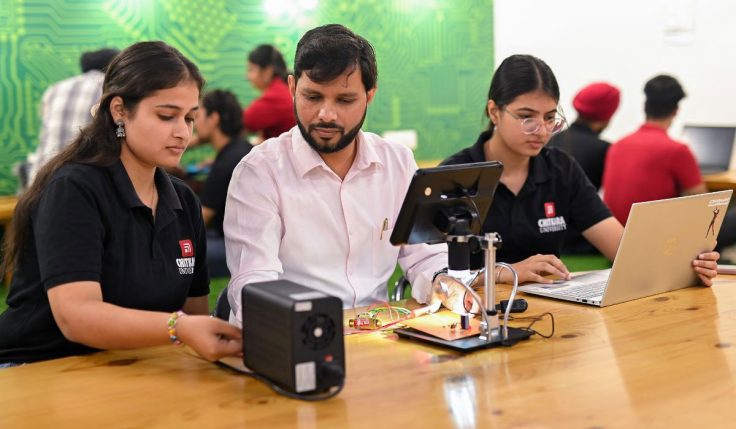In the frantic pace of today’s technical scenario, mechatronics engineering is a highly advanced discipline that integrates mechanical and electrical technologies with computing knowledge into one field. Under the wide-ranging 4-Year Bachelor of Engineering degree program in Mechatronics Engineering offered by Chitkara University, students may acquire the critical knowledge necessary to succeed in high-tech industries – such as robotics, manufacturing and healthcare.
Curriculum structure
B.E. in Mechatronics Engineering at Chitkara University is a four-year course with an emphasis on the system-based approach: balancing theoretical knowledge with hands-on application. State-of-art technologies are imparted to students for the challenges and demands of modern engineering problems.
Core Modules
- Basics of Mechanical Engineering and Electronics Engineering: Acquire foundation knowledge about interacting mechanical and electronic systems.
- Computer Science Fundamentals: This module focuses on programming and software development to equip the student with the skills to integrate software functionality in mechatronic systems.
- Robotics and Artificial Intelligence: These topics deal with design principles and applications of robotics, which teaches the student how AI can enhance automation.
- Machine Vision: This topic deals with the technology that enables machines to interpret visual information, a key aspect of modern manufacturing and robotics.
- Fluid Power Technology: Hydraulic and pneumatic studies; students learn how power can be transmitted through engineering systems.
- Materials Science: Materials properties and their applications, which are very crucial in developing efficient and long-lasting mechatronic systems.
- Analog and Digital Electronics: This part equips the students to work on both types of electronics that are the foundation of modern engineering applications.
Chitkara University believes in the concept of ‘learning by doing.’ Its reflection lies in lab sessions, as these keep the students busy, handling top-class equipment and technology, translating concepts into practical real-life contexts.
Experiential learning is the hallmark of Chitkara University, and state-of-the-art laboratories equipped with the latest technology are replete throughout the university to reflect current industry standards. This gives students a chance to work with the tools and equipment used in practice and thereby develops practical skills that employers value.
There is also a requirement in the curriculum for the students to spend 6 months to 1 year interning at blue-chip corporations. Exposure at this industry level helps them immerse themselves in real-life engineering environments, work on actual projects, and know the dynamics of the industries. The practical experience they get during this internship is so precious because it not only builds their resume but allows them to gain a much clearer understanding of the expectations and demands of employers in that field.
Career Opportunities in Mechatronics Engineering
Graduates of the B.E. in Mechatronics Engineering enjoy a wealth of diverse career opportunities across multiple sectors, thanks to the growing demand for skilled professionals who can design and manage “smart” devices and automated systems. Here are some potential career paths:
Robotics Engineer/Technician: Graduates can work on designing, testing, and deploying robotic systems used in various industries such as manufacturing, healthcare, and logistics. This role often involves programming robots to perform tasks autonomously and integrating them into existing systems.
Automation Engineer: In this role, engineers focus on developing and implementing automated systems that improve manufacturing efficiency and productivity. They design control systems and optimize processes to minimize human intervention while maximizing output.
Troubleshooting Engineer: Engineers specializing in troubleshooting diagnose and solve issues in electronic and mechanical systems. This critical role ensures that equipment is functioning optimally and can involve both fieldwork and laboratory testing.
Electronics Design Engineer: As experts in designing electronic components and systems, graduates can work in various sectors, from consumer electronics to automotive systems, crafting innovative solutions that meet market demands.
Mechanical Design Engineer: This role encompasses the design and analysis of mechanical systems, ensuring they meet relevant safety and performance standards while also considering factors such as cost and manufacturability.
Data Scientist/Big Data Analyst: With the rise of data-driven decision-making in technology and manufacturing, graduates equipped with skills in data analysis can pursue careers in interpreting complex datasets to drive business results.
Supply Chain Engineer: Graduates can optimize the logistics and supply chain processes in manufacturing, ensuring efficiency from raw material procurement to product distribution.
Also, read this blog post: Explore the Advancements in Robotics with Mechatronics Engineering
Importance of Mechatronics Engineering to the present world
Most of the revolutionary technologies, ranging from self-driving cars and automated assembly lines to drones and smart home devices, all essentially depend on integration between electronics and mechanical systems. In this context, Chitkara University Mechatronics Engineering is preparing its students to be well-positioned in their careers to keep abreast of these changes as well as innovate their area of specialization.
Some of the dominant trends to be emphasized include Industry 4.0, that is, smart manufacturing, and the digitization of industries, as well as IoT, that is, connecting devices and systems in order to improve communication.






